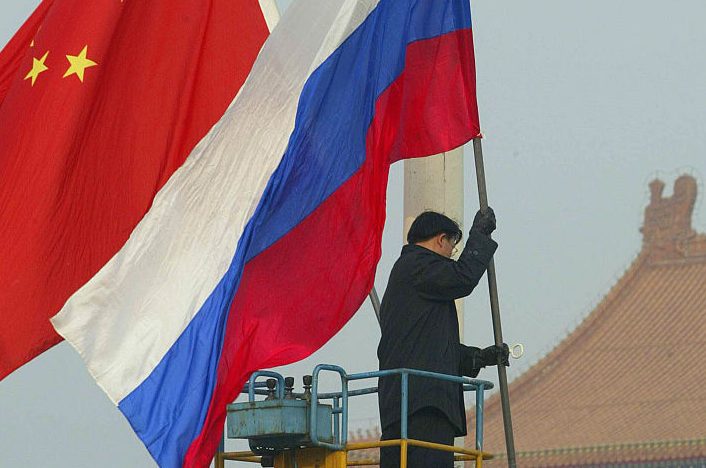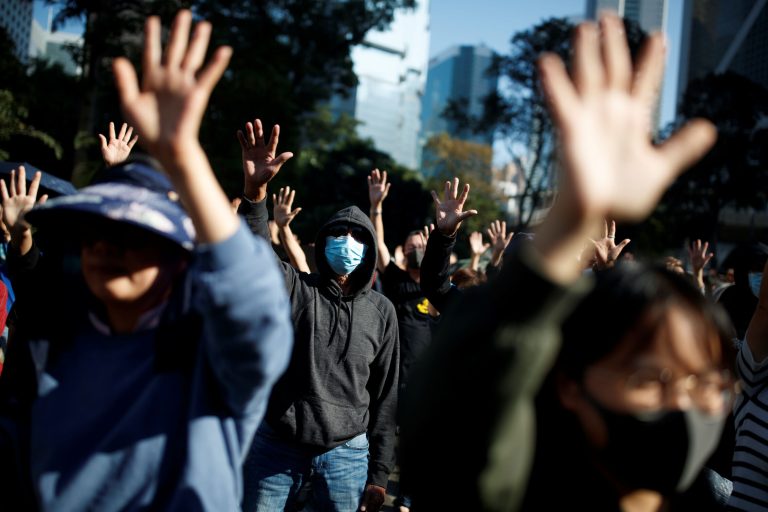News analysis
With Russia’s already-struggling economy getting battered with sanctions over the invasion of Ukraine, China has so far been willing to extend the world’s largest country some gestures of support, such as by avoiding condemnation of the Kremlin’s “special operation,” and lifting all trade restrictions on Russian wheat.
But amid Moscow’s deepening international isolation, cracks could be emerging in the facade, and China-Russia relations may be beginning to falter, some observers say.
Even as Beijing refrained from calling Russian President Vladimir Putin’s assault on Ukraine an “invasion” and blamed the U.S. and its allies for “inflaming an already tense situation,” China’s state-owned financial institutions have begun quietly distancing themselves from Russia’s economy.
The moves suggest a careful balancing act by Beijing as it seeks to maintain ties with Moscow in the public eye without openly violating sanctions, which could jeopardize its access to key Western export markets and the US dollar-centric international financial system, a report by Al Jazeera says.

READ MORE:
- Russians Protest War in Ukraine, Thousands Arrested by Police
- Russian Invasion of Ukraine Casts an Ominous Shadow Over Taiwan
- Battle for Kharkov Continues After Ukrainians Beat Off Initial Russian Advance
Beijing: Russia a ‘strategic partner,’ not ally
Success
You are now signed up for our newsletter
Success
Check your email to complete sign up
As the invasion of Ukraine intensifies and enters its fifth day, the People’s Republic of China (PRC) foreign ministry tried to place distance between Beijing’s relationship with Moscow and the hostilities occurring in Ukraine as Russian forces attempt to seize the capital of Kyiv.
During a daily press conference held today, PRC foreign ministry spokesman Wang Wenbin said: “China and Russia are comprehensive strategic partners of coordination. China-Russia relations are based on non-alliance, non-confrontation and non-targeting of third countries.”
The PRC’s position on the Ukraine crisis is “based on the merits of the matter itself,” Wang said, without elaborating further. “We always stand on the side of peace and justice.” He then reiterated a description of the situation as “complex,” refusing to side with either Kyiv or its massive neighbor.
Beijing’s roundabout support for Ukraine thus far has come in the form of one repeated phrase: “The sovereignty and territorial integrity of every country should be respected and safeguarded. The aims and principles of the UN Charter should be upheld. This is China’s consistent position, and is a basic norm governing international relations that all countries should subscribe to.”
READ MORE:
- Chinese Media Accidentally Publishes Censorship Guidelines on Russia-Ukraine Conflict
- Xi Tells Putin to Resolve Ukraine Conflict Via ‘Negotiation’, Lifts All Restrictions on Russian Wheat
Putin, in a television address given at the start of the invasion on Feb. 24, claimed that while the “special military operation” aimed to defeat Ukraine’s military and “denazify” its government, Russia has no designs on Ukraine’s sovereign territory.
The Russian leader, however, said in a previous speech that Ukraine’s statehood is a modern phenomenon, brought about mostly by the Bolshevik communist revolution of 1917 and Stalin’s westward conquests in World War II.
Wang said China wanted to maintain friendly relations with Ukraine, but quickly dismissed any possibility of joining global sanctions against Russia — the main instrument of punishment the U.S. and its allies have deployed in response to the Kremlin’s current and past actions in Ukraine.
“China does not approve of solving problems through sanctions,” Wang said. The official added that it was likely to cause new problems and a “lose-lose” economic situation for all. Chinese firms would continue trading with Russia, he suggested.

US pressures China to condemn invasion of Ukraine
On Feb. 27, White House press secretary Jen Psaki called on China to condemn Russia’s attack on Ukraine. “This is not a time to stand on the sidelines. This is a time to be vocal and condemn the actions of President Putin and Russia invading a sovereign country,” Psaki said Sunday.
In addition, the Biden administration indicated that the American president had not spoken with Chinese counterpart Xi Jinping recently but would be open to a “future call.” Psaki also stressed that regardless of whether the two leaders speak, there are “important steps for the Chinese leadership to look at themselves and really assess where they want to stand as the history books are written.”
During his speech last week, Biden did not mention China by name and only gave a veiled reference to the country.
“Putin will be a pariah on the international stage. Any nation that countenances Russia’s naked aggression against Ukraine will be stained by association,” Biden said.
The Biden administration also reportedly provided China’s intelligence on Russia-Ukraine tensions in hopes the communist regime would help dissuade the Kremlin from invading, but Beijing did just the opposite and shared this information with Russian forces instead.
According to the report by The Washington Times, U.S. officials began passing detailed knowledge of “large-scale Russian troop movements near Ukraine’s border” to Chinese diplomats starting last December.
Is China moving away from Russia?
After the U.S. and its allies agreed to impose sanctions against Russia’s central bank and disconnect key Russian banks from the SWIFT international financial transaction network, an official with connections to the White House said, “The latest signs suggest that China’s not coming to [Russia’s] rescue.”
Moscow’s exclusion from SWIFT, which stands for the Society for Worldwide Interbank Financial Telecommunication, means Russian banks won’t be able to communicate securely with banks beyond their border.
The senior Biden administration official, who spoke on the condition of anonymity in order to share Washington’s thinking, said the new sanctions will take effect immediately and are aimed at making Russia’s continued invasion of Ukraine as “difficult as possible.”
“We wanted to put these actions in place before our markets open because what we learned over the course of the weekend from our allies and partners was the Russian Central Bank was attempting to move assets and there would be a great deal of asset flight starting on Monday morning from institutions around the world,” the official said during a conference call with reporters.
“Our strategy to put it simply is to make sure that the Russian economy goes backward. As long as President Putin decides to go forward with his invasion of Ukraine,” the official said.
The source added that certain Chinese banks have stopped issuing letters of credit for purchases of physical commodities from Russia — a sign that Beijing may have started to distance itself from Moscow.
Russia’s economy takes big hit
Since the penalties were imposed late last week, Russia’s markets went into a nosedive. The Russian ruble fell as low as 111 on Monday, Feb. 28 to the U.S. dollar from 83 on Friday, Feb. 25 — a drop of more than 20 percent. If that weakening holds, it would represent one of the largest single-day declines in the value of Moscow’s currency ever recorded.

The Bank of Russia, the nation’s central bank, stepped in to help stop the ruble’s steep drop by more than doubling the country’s benchmark interest rate to 20 percent, from an earlier value of 9.5 percent. The hike in rates is designed to tempt savers to leave their cash in Russian banks after the U.S. and its allies moved to isolate Moscow’s biggest lenders from international markets.
The major market-based upheaval prompted the Russian central bank to keep the country’s stock exchange — the Moscow Exchange — closed today (Feb. 28) and possibly would remain closed throughout the week as the Ukraine invasion continues.














